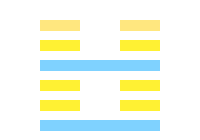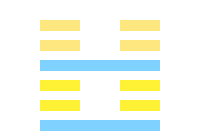51.2.3.5 (51 > 43)

51.2.3.5 (51 > 43) - THE KĂN HEXAGRAM.
- 2. The second line, divided, shows its subject, when the movement approaches, in a position of peril. He judges it better to let go the articles (in his possession), and to ascend a very lofty height. There is no occasion for him to pursue after (the things he has let go) ; in seven days he will find them.
- 3. The third line, divided, shows its subject distraught amid the startling movements going on. If those movements excite him to (right) action, there will be no mistake.
- 5. The fifth line, divided, shows its subject going and coming amidst the startling movements (of the time), and always in peril ; but perhaps he will not incur loss, and find business (which he can accomplish).
51.2.3.5 (51 > 43) - Shock
One lets others believe that their chances of winning are almost nil.
Bing DeepL Google Yandex51.2.3.5 (51 > 43) - Shock
One lets others believe that their chances of winning are almost nil.
Bing DeepL Google Yandex51.2.3.5 (51 > 43) - Kán, l’ébranlement
Kán : tonnerre, effroi répandu, crainte.
- 2. Quand le tonnerre gronde, le danger arrive, on croit devoir tout abandonner et se retirer en un lieu sûr et élevé. Qu’on ne s’obstine pas à rechercher alors ce qu’on a abandonné ; on le retrouvera quelque temps après. (Quand le danger sera passé.)
- 3. Le tonnerre émeut, agite ; il pousse à agir justement.
- 5. Le tonnerre allant et venant répand l’effroi ; mais on doit tâcher de ne pas abandonner les affaires entreprises. Même dans le danger pressant, on doit garder le milieu.
51.2.3.5 (51 > 43) - Le choc
On laisse les autres croire que leurs chances de l'emporter sont quasiment nulles.
Bing DeepL Google Yandex51.2.3.5 (51 > 43) - Megrázkódtatás
- 2. Ne keresse ami elveszett.
- 3. Meglátva a szakadást otthagyja őket.
- 5. Szilárdan áll a megrázkódtatás kezdetekor és végigkíséri a többieket míg véget nem ér.
The trigrams
The trigrams are combinations of three yin and yang lines. The three bottom lines of the hexagram form the lower trigram and represent the inner situation. The three top lines form the upper trigram and represent the outer situation.
Upper trigram: The thunder The lake


Lower trigram: The thunder The sky


The formation: 51
What is already there

51 - THE KĂN HEXAGRAM.
Kăn gives the intimation of ease and development. When (the time of) movement (which it indicates) comes, (the subject of the hexagram) will be found looking out with apprehension, and yet smiling and talking cheerfully. When the movement (like a crash of thunder) terrifies all within a hundred lî, he will be (like the sincere worshipper) who is not (startled into) letting go his ladle and (cup of) sacrificial spirits.
Bing DeepL Google Yandex51 - Shock
Something is coming which enables the identification of a problem.
Bing DeepL Google Yandex51 - Shock
Something is coming which enables the identification of a problem.
Bing DeepL Google Yandex51 - Kán, l’ébranlement
Kán : tonnerre, effroi répandu, crainte.
Kán« tonnerre, effroi se répandant, appréhension ». Le tonnerre survenant répand l’effroi ; par l’effroi, les rires et les causeries s’arrêtent court. Le tonnerre terrifie cent lis, mais ne doit pas arrêter la cuiller du sacrifice aux esprits (le sacrifice) 1.
1 Le tonnerre peut arrêter tout mais pas empêcher le sacrifice.
Texte
Le tonnerre approchant répand l’effroi ; les rires, les causeries s’arrêtent subitement. Le tonnerre terrifie cent lis, mais ne doit pas arrêter la cuiller du sacrifice aux esprits.
Commentaire
Cet effroi a d’heureux résultats. Les rires et les causeries gardent ainsi la mesure. Le tonnerre terrifie ce qui est loin comme ce qui est près. Mais on doit, quand même, garder le temple des ancêtres, les autels des génies du sol et présider aux sacrifices. (Malgré l’effroi, on ne peut les interrompre.)
Symbolisme
Le tonnerre répété forme l’hexagramme. Le sage, plein de crainte et de scrupules prudents, observe et corrige.
51 - Megrázkódtatás
Valami közelít ami lehetővé teszi a probléma felismerését.
Bing DeepL Google Yandex
51.2 (51 > 54) - THE KĂN HEXAGRAM.
The second line, divided, shows its subject, when the movement approaches, in a position of peril. He judges it better to let go the articles (in his possession), and to ascend a very lofty height. There is no occasion for him to pursue after (the things he has let go) ; in seven days he will find them.
Bing DeepL Google Yandex51.2 (51 > 54) - Kán, l’ébranlement
Kán : tonnerre, effroi répandu, crainte.
Quand le tonnerre gronde, le danger arrive, on croit devoir tout abandonner et se retirer en un lieu sûr et élevé. Qu’on ne s’obstine pas à rechercher alors ce qu’on a abandonné ; on le retrouvera quelque temps après. (Quand le danger sera passé.)
Bing DeepL Google Yandex
51.3 (51 > 55) - THE KĂN HEXAGRAM.
The third line, divided, shows its subject distraught amid the startling movements going on. If those movements excite him to (right) action, there will be no mistake.
Bing DeepL Google Yandex51.3 (51 > 55) - Kán, l’ébranlement
Kán : tonnerre, effroi répandu, crainte.
Le tonnerre émeut, agite ; il pousse à agir justement.
Bing DeepL Google Yandex
51.5 (51 > 17) - THE KĂN HEXAGRAM.
The fifth line, divided, shows its subject going and coming amidst the startling movements (of the time), and always in peril ; but perhaps he will not incur loss, and find business (which he can accomplish).
Bing DeepL Google Yandex51.5 (51 > 17) - Getting pushed around
One holds firm when the tremors begin, accompanies the others and endures them until they stop.
Bing DeepL Google Yandex51.5 (51 > 17) - Getting pushed around
One holds firm when the tremors begin, accompanies the others and endures them until they stop.
Bing DeepL Google Yandex51.5 (51 > 17) - Kán, l’ébranlement
Kán : tonnerre, effroi répandu, crainte.
Le tonnerre allant et venant répand l’effroi ; mais on doit tâcher de ne pas abandonner les affaires entreprises. Même dans le danger pressant, on doit garder le milieu.
Bing DeepL Google Yandex51.5 (51 > 17) - Se faire bousculer
On se tient fermement quand les secousses commencent, on accompagne les autres et on les endure jusqu'à ce qu'elles cessent.
Bing DeepL Google Yandex51.5 (51 > 17) - Megrázkódtatás
Szilárdan áll a megrázkódtatás kezdetekor és végigkíséri a többieket míg véget nem ér.
Bing DeepL Google YandexIn the making: 43
What is poised to happen

43 - THE KWÂI HEXAGRAM.
Kwâi requires (in him who would fulfil its meaning) the exhibition (of the culprit's guilt) in the royal court, and a sincere and earnest appeal (for sympathy and support), with a consciousness of the peril (involved in cutting off the criminal). He should (also) make announcement in his own city, and show that it will not be well to have recourse at once to arms. (In this way) there will be advantage in whatever he shall go forward to.
Bing DeepL Google Yandex43 - Revelation
The case must be clearly stated, shouting is dangerous. Explain the situation to your entourage. Avoid any brutality, do not turn away.
Bing DeepL Google Yandex43 - Revelation
The case must be clearly stated, shouting is dangerous. Explain the situation to your entourage. Avoid any brutality, do not turn away.
Bing DeepL Google Yandex43 - Kwài, la décision
Kwāi : 1. Rivière divisée en branches ; diviser, couper, disperser ; 2. Décider, régler définitivement, résolu, tranchant ; 3. Habileté, art, prudence.
Texte
Allant à la cour du prince, on doit y faire appel avec sincérité. En cas de différend, on doit avertir ses concitoyens qu’il n’y a pas avantage à recourir aux moyens violents, aux armes, mais qu’il faut faire décider par le pouvoir judiciaire.
Symbolisme
La ligne faible (coupée) au haut de cinq fortes représente l’appel (du petit) à la cour du prince. — Le ciel sur l’eau stagnante représente la décision ferme. Si le sage, en donnant des émoluments à ses inférieurs, veut rester fidèle à la vertu, il devra être très prudent.
Commentaire
Kwài est « décider, régler ». Le fort le fait pour le faible. Il faut en cela, fermeté et douceur, résolution et concorde. « Appel sincère » dans une difficulté grave. Le recours aux armes fait périr ce qu’on tient le plus à avoir. Le fort emporte le bon et c’est tout.
43 - La révélation
L'affaire doit être exposée clairement, crier entraîne le danger. Expliquer la situation à son entourage. Eviter toute brutalité, ne pas se détourner.
Bing DeepL Google Yandex43 - Kinyilatkoztatás
Az aggodalmakat egyértelműen kell ismertetni, a hangos nézeteltérés veszélyt okoz. Ki kell fejteni a helyzetet a kisérőinek. Kerülni kell az erőszakot és nem szabad eltérülni.
Bing DeepL Google YandexThe nuclear hexagram: 39.1.2.4.6 (39 > 1)
The nuclear hexagram is the association of the two inner trigrams (lines 2,3,4 and 3,4,5). It represents the root, or the origin of the situation.

39.1.2.4.6 (39 > 1) - THE KIEN HEXAGRAM.
- 1. From the first line, divided, we learn that advance (on the part of its subject) will lead to (greater) difficulties, while remaining stationary will afford ground for praise.
- 2. The second line, divided, shows the minister of the king struggling with difficulty on difficulty, and not with a view to his own advantage.
- 4. The fourth line, divided, shows its subject advancing, (but only) to (greater) difficulties. He remains stationary, and unites (with the subject of the line above).
- 6. The topmost line, divided, shows its subject going forward (only to increase) the difficulties, while his remaining stationary will be (productive of) great (merit). There will be good fortune, and it will be advantageous to meet with the great man.
39.1.2.4.6 (39 > 1) - Inquiring before complying
One asks others what they have decided before partnering with them.
Bing DeepL Google Yandex39.1.2.4.6 (39 > 1) - Inquiring before complying
One asks others what they have decided before partnering with them.
Bing DeepL Google Yandex39.1.2.4.6 (39 > 1) - Kién, l’obstacle
Kién : Difficulté, danger, noble hardiesse.
-
1. Si l’on va (courageusement) aux choses difficiles, on reviendra comblé de louanges.
Il convient d’être ferme. - 2. Si le prince et ses ministres ont difficultés sur difficultés, ce n’est point (nécessairement) parce qu’ils recherchent leur propre avantage (ou : cela ne dépend pas nécessairement d’eux-mêmes).
-
4. Un autre y va et revient uni à ceux qui les ont partagées.
Il faut être fidèle dans ses fonctions. -
6. Un autre y va également et revient plus éclairé et intelligent.
Il a la juste mesure.
Un dernier y va de même et revient plein de mérite et de succès. Il atteint les qualités du grand homme.
39.1.2.4.6 (39 > 1) - Se renseigner avant d’obtempérer
On demande aux autres ce qu’ils ont décidé avant de s’associer avec eux.
Bing DeepL Google Yandex39.1.2.4.6 (39 > 1) - Bizonytalanság
- 1. Mások ellenállnak mert nem ellenőrizte, így közvetítőt kér hogy felülvizsgálják a munkáját.
- 2. Sok nehézség mások táplálásában.
- 4. A többiek nincsenek ott így várnia kell rájuk.
- 6. Kéri eltávolodott barátait hogy térjenek vissza.
Ruler
The starting situation

51.5 (51 > 17) - THE KĂN HEXAGRAM.
The fifth line, divided, shows its subject going and coming amidst the startling movements (of the time), and always in peril ; but perhaps he will not incur loss, and find business (which he can accomplish).
Bing DeepL Google Yandex51.5 (51 > 17) - Getting pushed around
One holds firm when the tremors begin, accompanies the others and endures them until they stop.
Bing DeepL Google Yandex51.5 (51 > 17) - Getting pushed around
One holds firm when the tremors begin, accompanies the others and endures them until they stop.
Bing DeepL Google Yandex51.5 (51 > 17) - Kán, l’ébranlement
Kán : tonnerre, effroi répandu, crainte.
Le tonnerre allant et venant répand l’effroi ; mais on doit tâcher de ne pas abandonner les affaires entreprises. Même dans le danger pressant, on doit garder le milieu.
Bing DeepL Google Yandex51.5 (51 > 17) - Se faire bousculer
On se tient fermement quand les secousses commencent, on accompagne les autres et on les endure jusqu'à ce qu'elles cessent.
Bing DeepL Google Yandex51.5 (51 > 17) - Megrázkódtatás
Szilárdan áll a megrázkódtatás kezdetekor és végigkíséri a többieket míg véget nem ér.
Bing DeepL Google YandexCorrection
The direction where the ruler is going to bend

51.2.3 (51 > 34) - THE KĂN HEXAGRAM.
- 2. The second line, divided, shows its subject, when the movement approaches, in a position of peril. He judges it better to let go the articles (in his possession), and to ascend a very lofty height. There is no occasion for him to pursue after (the things he has let go) ; in seven days he will find them.
- 3. The third line, divided, shows its subject distraught amid the startling movements going on. If those movements excite him to (right) action, there will be no mistake.
51.2.3 (51 > 34) - Shock
One makes a summary to explain to others what it is about.
Bing DeepL Google Yandex51.2.3 (51 > 34) - Shock
One makes a summary to explain to others what it is about.
Bing DeepL Google Yandex51.2.3 (51 > 34) - Kán, l’ébranlement
Kán : tonnerre, effroi répandu, crainte.
- 2. Quand le tonnerre gronde, le danger arrive, on croit devoir tout abandonner et se retirer en un lieu sûr et élevé. Qu’on ne s’obstine pas à rechercher alors ce qu’on a abandonné ; on le retrouvera quelque temps après. (Quand le danger sera passé.)
- 3. Le tonnerre émeut, agite ; il pousse à agir justement.
51.2.3 (51 > 34) - Le choc
On fait un résumé pour expliquer aux autres de quoi il s'agit.
Bing DeepL Google Yandex51.2.3 (51 > 34) - Megrázkódtatás
- 2. Ne keresse ami elveszett.
- 3. Meglátva a szakadást otthagyja őket.

